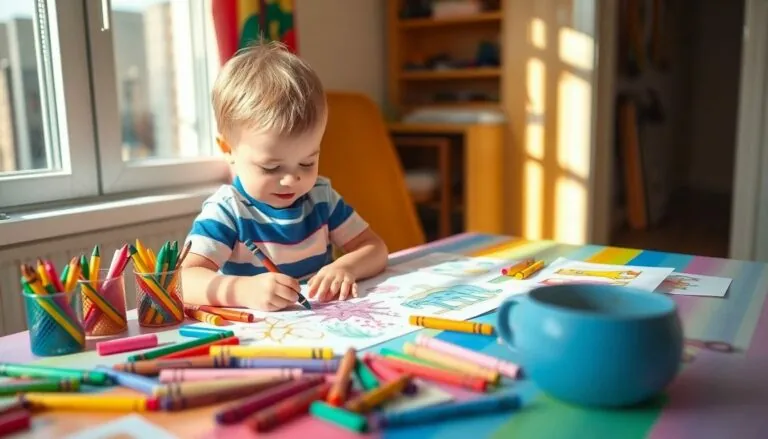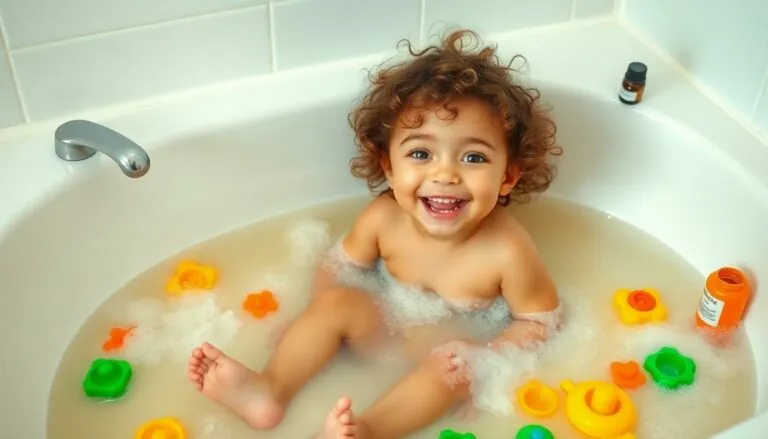Table of Contents
ToggleEver walked into a room and heard a sound that makes you question your sanity? That’s right—it’s your toddler grinding their teeth like a mini rock star. While it might sound like they’re auditioning for a heavy metal band, this peculiar habit is more common than you think.
Understanding Teeth Grinding in Toddlers
Teeth grinding, or bruxism, often occurs during sleep or playtime. Many toddlers grind their teeth as a response to various stimuli. Stress or discomfort can trigger this behavior, making it more frequent during times of change, such as starting preschool or family transitions.
Symptoms associated with teeth grinding include jaw pain, headaches, and earaches. Identifying these signs can help parents determine if they should consult a dentist. Dentists often suggest monitoring the frequency and duration of grinding episodes for proper assessment.
The exact reasons behind teeth grinding in toddlers remain unclear. Some studies indicate that misaligned teeth contribute significantly. Anxiety and stress also introduce heightened tension in the jaw, leading to grinding behavior. Excitement or frustration can trigger this involuntary response, making it common during play or social interactions.
Factors like teething also play a role in grinding behavior. Pressure from emerging teeth can cause discomfort, prompting toddlers to grind. Parents often observe increased grinding during teething periods, which may signal objections to pain.
Parents can adopt strategies to reduce teeth grinding episodes. Creating a calming bedtime routine can ease anxiety, while ensuring a comfortable sleeping environment promotes relaxation. Engaging in soothing activities, such as reading or quiet play, can also help.
While tooth grinding might seem alarming, most toddlers outgrow this habit. Monitoring the situation and consulting healthcare professionals when necessary ensures proper care. Understanding the dynamics and underlying causes of teeth grinding fosters an informed response to this common childhood behavior.
Common Causes of Teeth Grinding
Teeth grinding can arise from various factors affecting toddlers. Understanding these causes helps caregivers address the issue effectively.
Sleep-Related Factors
Sleep disturbances often trigger teeth grinding. Transitioning to a new sleeping arrangement, such as moving from a crib to a bed, may generate anxiety. This shift can lead to restlessness at night. Additionally, interrupted sleep can exacerbate grinding episodes. Some toddlers grind their teeth during deep sleep stages, where muscle activity increases. Overstimulating environments or excessive screen time right before bed can further affect sleep quality.
Emotional Stressors
Emotional stressors significantly contribute to teeth grinding. Changes, such as the arrival of a new sibling or starting daycare, may induce anxiety in young children. They may not express their feelings verbally, leading to physical manifestations like grinding. Feelings of unease or aggression observed during play can also trigger this behavior. Observing their emotional responses can help parents identify stress triggers. Implementing calming techniques, like deep breathing exercises, can reduce anxiety and related grinding.
Dental Issues
Dental issues frequently lead to teeth grinding habits. Misaligned teeth or bite problems can cause discomfort, prompting toddlers to grind their teeth. As they experience teething or the growth of new molars, soreness might increase grinding occurrences. Regular dental checkups ensure that any malocclusion or erupting teeth receive proper attention. Consulting a pediatric dentist can provide insights into how dental health affects grinding behavior. Addressing these concerns can improve comfort and reduce grinding episodes.
Symptoms to Look For
Observing specific symptoms can help identify whether a toddler grinds their teeth.
Signs of Teeth Grinding
Common signs of teeth grinding include worn-down tooth surfaces, which may indicate frequent grinding. Parents might notice unusual sounds during sleep, such as gnashing or grinding noises. Uneven wear on teeth serves as a visual cue to potential bruxism. Behavioral changes may also appear, such as irritability or difficulty concentrating, suggesting that discomfort may be present. Chewing on hard objects or clenching the jaw often occurs alongside teeth grinding, further signaling the issue.
Consequences of Grinding
Consequences of teeth grinding may include persistent jaw pain, which can affect a toddler’s overall comfort. Frequent grinding can result in headaches or facial pain, leading to distress. Earaches sometimes develop due to tension and pressure from grinding activities. Misalignment of teeth can occur as a long-term effect, necessitating professional dental assessment. Sleep disruptions may arise as grinding interferes with restful sleep, affecting daily activities. Recognizing these consequences allows parents to address the behavior effectively.
How to Address the Issue
Addressing teeth grinding in toddlers involves both home remedies and professional guidance. Parents can implement strategies to alleviate this behavior and ensure their child’s comfort.
Home Remedies
Home remedies can help reduce teeth grinding episodes. Creating a calming bedtime routine promotes relaxation and minimizes stress. Using warm compresses on the jaw can relieve tension. Gentle massages around the jaw area also assist in relaxing tight muscles. Providing a safe chewing option, like a soft toy, may distract toddlers from grinding. Ensuring adequate sleep and a comforting sleep environment is essential, as tiredness can contribute to bruxism. Monitoring the child’s diet, specifically limiting sugary and caffeinated foods, may also alleviate the issue.
Professional Guidance
Consulting a dentist may provide essential insights into addressing teeth grinding. Dental professionals can assess the child’s bite and identify any misalignments that may contribute to the behavior. They may recommend a mouthguard, designed to protect teeth during grinding. Additionally, seeking advice from a pediatrician can help pinpoint stressors affecting the toddler’s emotional well-being. Behavioral therapy might be useful for managing anxiety triggers. Tracking patterns related to stress or sleep disturbances serves to inform both care approaches.
Conclusion
Understanding why toddlers grind their teeth is crucial for parents seeking to address this common behavior. While it can be concerning, recognizing the potential triggers and symptoms allows for effective management. Most toddlers outgrow this habit with time and support. By implementing calming routines and consulting professionals when necessary, parents can help their children navigate this phase. Staying informed and attentive ensures that any underlying issues are addressed, promoting their child’s overall well-being. With the right approach, parents can turn this noisy phase into a manageable part of their toddler’s development.








